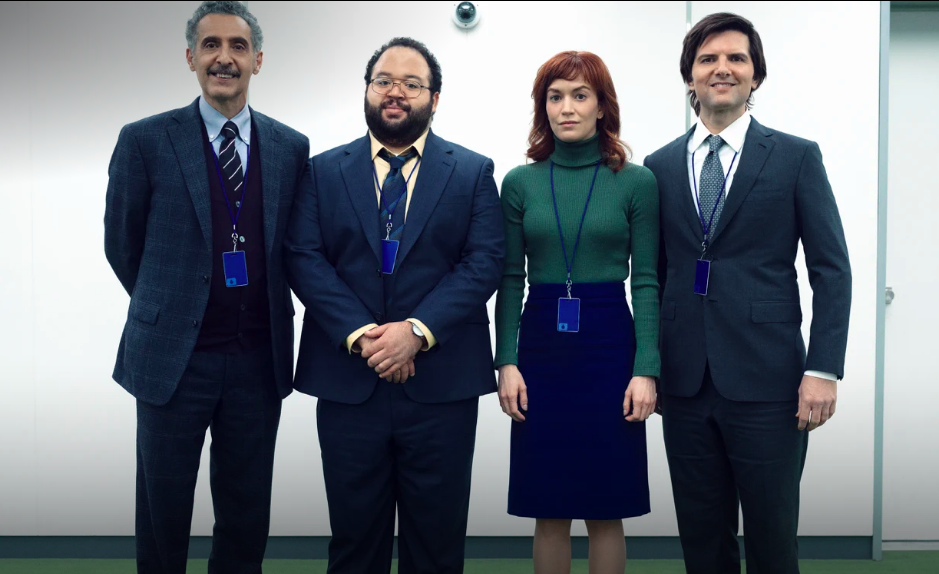written by Maryam Dada, M.A., RCC
mildly edited by Linda Lin, RCC, CCC, RCAT
I started watching the hit show Severance on the recommendation of one of my besties who works in the corporate world. The show, which is currently receiving a lot of attention for its sci-fi portrayal of ‘work-life balance,’ depicts the lives of corporate workers at Lumon, a Biotech company. These employees have undergone a surgical procedure, known as severance, that allows them to mentally separate their work life from their personal life. An implanted device causes employees to lose all their memories of the outside world, which then creates a split personality— the “innie” who works at Lumon, and the “outie” who gets to live their personal life.
We’re going to be exploring the importance of mind-body connection, explain the role of our nervous systems (specifically the ANS), and what it looks like to live an ‘embodied’ life.
What Is Severance Really Saying About Work-Life Balance?
As I was watching, I couldn't help but think of all the different mental health implications of a severance procedure while also recognizing the appeal of getting some separation from work and the very coveted ‘work life balance’… especially under late-stage capitalism.
Severance is set in the near future where getting this medical procedure is certainly controversial but also advertised, encouraged, and appealing for many.
The main character, Mark, was a history professor at the local university whose wife died in a car accident. We learn that Mark chose to work for Lumon because it was easier than grieving his dead wife; which of course, is not the healthiest solution for grief and loss, but it does humanize our main character and sets the premise for some pretty important mental health questions. Namely, can work-life balance be achieved by splitting our personalities?
If our work personas only exist at work, it sure would make it a lot easier to not bring work home, to not think about work after hours, or to work overtime. And for our main character, Mark, having the option of forgetting about his partner’s death, seems like a surefire way to not deal with it™.
Although, I wonder how true that actually is.
While a very interesting premise and story-line, with many different undertones about our society and the emphasis we place on work, and how human beings respond to and deal with trauma, or even the ethical implications about having what is essentially a clone…
I think one of the biggest considerations for me was thinking about what happens to our bodies.
The Mind-Body Connection: Why Compartmentalization Doesn't Work
From a therapeutic perspective, we might be able to mentally compartmentalize parts of our lives and that kind of organization can certainly be helpful, however we cannot escape from our bodily sensations.
The mind-body connection operates on the belief that our mental and physical health are linked (Pally, 1998). When we feel dysregulated or even discomfort, we are likely experiencing a mental and physical symptom.
For example, when you are feeling anxious you might start to have racing thoughts, while also noticing your muscles tensing or your palms becoming sweaty, you could have butterflies in your tummy, or even be feeling nauseous.
Strengthening the mind-body connection is a gentle reminder that we are made up of not only our mental states but also our physical states. It’s acknowledging that our bodies are not simply vehicles for our minds, but that two work in tandem to keep us healthy.
Understanding the Autonomic Nervous System and Stress
When we work to strengthen that mind-body connection we are engaging in a form of emotional regulation and directly working with our nervous systems.
The Autonomic Nervous System (ANS)
is our body’s command centre that influences everything from our breathing to our heart rate and how we navigate and understand stress (Gibbons, 2019).
The ANS can be thought of in two parts: the sympathetic nervous system and the parasympathetic nervous system.
Sympathetic Nervous System (SNS): Our bodies’ fight or flight response that activates when we perceive a threat. It prepares our body by increasing our heart-rate, blood pressure, and by releasing adrenaline.
Parasympathetic Nervous System (PNS): Our bodies’ at rest and digest. After a stressful situation, this system allows our body to slow and restore balance.
ANS and the Severance Department: Our Bodies’ Aren’t Separate
Our ANS plays a big role in our bodies response to stress and furthers the importance of strengthening the mind-body connection. In Severance, characters who’ve undergone the medical procedure are only mentally compartmentalizing their lives. This means that if either the innie or the outie experiences a significant amount of stress or trauma —it will show up in the body for both of them.
If the fight or flight response gets triggered for the innie at work, their outie will feel the effects of that in their body too. One could even argue that being severed doubles the stress, exacerbated by the fact that neither personality can remember what happens to the other.
When we start to factor in mind-body connection, including how our autonomic nervous system plays a role, the curtain gets pulled back a bit more, and we see that ‘work-life balance’ for the characters in Severance is merely a mirage.
Practical Ways to Cultivate an Embodied Life
Our bodies are central to our mental health, when we are living in ways that are embodied or simply, being in tune with the way our body feels throughout the day, we are more likely to engage in the kind of emotional regulation that activates the parasympathetic nervous system — when we are recalibrating and at rest.
This is easier said than done and it takes practice. It’s a normal thing to want to compartmentalize, run away, or hide from our problems/feelings and a large part of that is societal conditioning to value productivity.
One of the ways we can practice becoming more embodied is to give ourselves permission to exist, be, and/or live slower but with more intention. This is where somatic interventions like box breathing, grounding exercises, physical activity, or meditations can help by bringing us back into the present moment and creating an awareness of our body to develop a more holistic approach to our healing.
Further Reading on Trauma, Stress, and Embodiment
Invitations for further study
Bodies you can mirror when being in your own is just too much via Instagram @eroticsofliberation https://www.instagram.com/p/DGLGS6WssSC/?igsh=MWVmODAyM2oyYXBoNg==
Book: The Pain We Carry: Healing from Complex PTSD for People of Color by Natalie Y. Gutiérrez
Podcast: The Meaning of Embodiment, with Prentis Hempill https://www.ted.com/talks/how_to_be_a_better_human_the_meaning_of_embodiment_w_prentis_hemphill
References:
Pally, R. (1998). Emotional Processing; The mind-body connection. The International journal of psycho-analysis, 79(2), 349.
Gibbons, C. H. (2019). Basics of autonomic nervous system function. Handbook of clinical neurology, 160, 407-418.
About the Author:
Maryam is a Registered Clinical Counsellor at Decipher. She is currently taking new clients! If you like to explore themes in tv, media, or literature and how it relates to your life or the different things you may be going though, she may be a good fit.
Interested in exploring work-life balance and embodiment through therapy? Book a session with Maryam today—available online and in person in so-called Vancouver, BC.

















